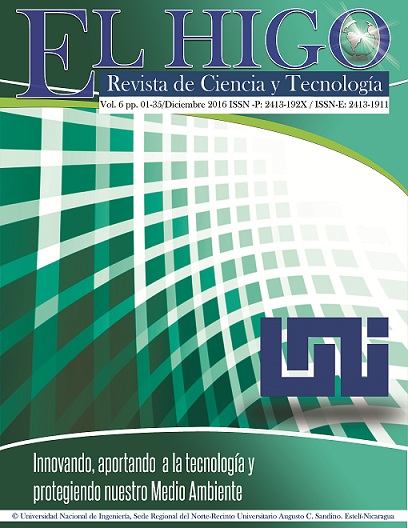Determination of energy efficiency of adobe improved fire in communities of the Sebaco municipality and municipality of Matagalpa
Keywords:
Improved cooker, Traditional stove, Energy efficiencyAbstract
The research was financially supported by the United Nations Development Program (UNDP) and was developed within the framework of collaboration between the Zompopo Collective Association, the National University of Engineering Northern Regional Headquarters and the University of the Basque Country-Spain And aimed to determine the energy efficiency of two designs of improved adobe stove as well as traditional stoves. The study consisted of two phases for data collection, the first data collection was performed in the first design of stove (from now on improved stove type 1) in communities of Sébaco and the second collection was made in the second design of Stove (from now on improved stove type 2) in communities of Matagalpa. The variables that allowed to determine the energy efficiency of the stoves were the grams of fuel used to cook 1 pound of rice and the cooking time. By means of the test of variance it was possible to verify the significant differences of the variables specific fuel consumption and cooking time in which it was obtained that the two types of improved stove present significant differences with the traditional stove in terms of specific consumption of fuel and in terms Of cooking time the type 1 cooker differs from the type 2 cooker and the traditional cooker. In the same way the incidence in the energy efficiency of the type 1 stove was determined with the variation of the measurement of the chimney of this, where it was concluded that the specific consumption of fuel does not depend on the height of the chimney of the stove.
Downloads
Downloads
Published
How to Cite
Issue
Section
License
Los artículos publicados en la revista El Higo, Nicaragua, se comparten bajo términos de la licencia Creative Commons: Reconocimiento, No Comercial, Compartir Igual. que permite a terceros utilizar lo publicado siempre que mencionen la autoría del trabajo y a la primera publicación en esta revista. ![]()
Los autores/as pueden realizar otros acuerdos contractuales independientes y adicionales para la distribución no exclusiva de la versión del artículo publicado en esta revista (p. ej., incluirlo en un repositorio institucional o publicarlo en un libro) siempre que indiquen claramente que el trabajo se publicó por primera vez en esta revista.







